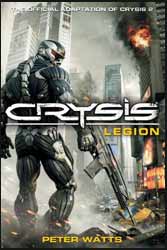|
Click here to return to the main site. Book Review
Sent in with your squad to the Big Apple to face god knows what, the first thing that you encounter is your submarine being torn apart. Fighting the wreckage and the fear of drowning you burst to the surface, straight into hell. Mortally wounded you are rescued by a stranger who places you within an advanced combat suit, before watching him blow his brains out. Alone, hunted by both the military and alien invaders, what do you do now...? Crysis: Legion is the official novelisation riding on the back of the Crysis 2 console and PC game. The book is written by Hugo Award winner Peter Watts. Translating games into books is a hazardous business, which usually works best when an established author uses the game world to tell their own story; it is much more difficult to remain faithful to the game without producing a dull novel. Peter Watts has done his best to produce something which transcends the game and mostly succeeds. The structure of the book is interesting, our unnamed protagonist spends the majority of the book recounting what has happened to him to a supposed investigator, though the mystery is maintained as the reader has little way of placing the events into a place or time. This simple device allows Watts to play with perspective and time when dealing with what feels like a pretty sequential game. He further muddies the water with communiqués, official documents and radio chatter to give the impression that all this information is being supplied sometime after the event, it was a device which worked well for Stephen King with Carrie and it works just as well here, - he has even gone to the lengths to add annotations to some parts of the book. This means that, for the most part, the book work very well. With his literary sleight of hand he distracts us from the narratives, central, linier nature, which is the less interesting portion of the book. But even the best writer can’t hold off the audiences creeping realisation that the central core of the book consists of just one fight after another, with our hero meeting the occasional boss alien. If Watts had not been such a good writer then the book would have been predictable in a far shorter space of time. It does dip somewhere in the third quarter, but picks up towards the end. He balances the action sequences with the more existential musings of our hero. The majority of the book is written in the first person, which has the unfortunate effect of removing depth from the supporting characters. So, the book is not without its problems, but these are inherent in the game medium and not the writing. 6 Charles Packer |
|---|


